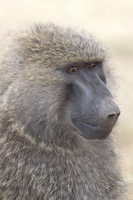|
 The
Olive baboon is the most wide ranging of all baboons, being
found in savannahs, steppes, and forests of 25 countries throughout
Africa, extending from Mali eastward to Ethiopia and Tanzania. Omnivorous,
they are able to find nutrition in almost any environment, and are
able to adapt with different foraging tactics. They eat a large
variety of plants (such as leaves, grass, roots, bark, flowers,
fruit, lichens, tubers, seeds, mushrooms, corms, and rhizomes),
and invertebrates and small mammals, as well as birds. In dry, arid
regions, such as the northeastern deserts, they hunt small invertebrates
like insects, spiders, and scorpions and elsewhere larger animals
such as small rodents and hares to foxes and other primates. Its
limit is usually small antelope, such as Thomson's gazelle and also,
rarely, sheep, goats, and live chickens, which may amount to 33.5%
of its food from hunting. In Eritrea, the olive baboon has formed
a symbiotic relationship with that country's endangered elephant
population. The baboons use the water holes dug by the elephants,
while the elephants use the tree-top baboons as an early warning
system. They live in groups of 15 to 150, made up of a few males,
many females, and their young. Each baboon has a social ranking
somewhere in the group, and female dominance is hereditary, with
daughters having nearly the same rank as their mothers. Despite
being hierarchical, baboons appear to be democratic when it comes
to deciding the direction of collective movement. Individuals are
more likely to follow when multiple decision-makers agree on what
direction to go rather than simply following dominant individuals.
The male olive baboon is on average, 70 cm tall while standing and
24 kg while the female measures 60 cm in height and averages 14.7
kg and they both have a green-grey coat. Like other baboons, they
have an elongated, dog-like muzzle. Their tail almost looks as if
it is broken, and they have a bare patch on their rump and a cheek
pouch in which to store food. They communicate with various vocalizations
and facial expressions. Adults give a range of calls and the most
common facial expression of the olive baboon is "lipsmacking", which
is associated with a number of behaviors. They are listed as least
concern because they are "very widespread and abundant and although
persecuted as a crop raider there are no major threats believed
to be resulting in a range-wide population decline." Despite persecution,
the baboon is still widespread and numerous. However, competition
and disease have possibly led to fewer baboons in closed forests. The
Olive baboon is the most wide ranging of all baboons, being
found in savannahs, steppes, and forests of 25 countries throughout
Africa, extending from Mali eastward to Ethiopia and Tanzania. Omnivorous,
they are able to find nutrition in almost any environment, and are
able to adapt with different foraging tactics. They eat a large
variety of plants (such as leaves, grass, roots, bark, flowers,
fruit, lichens, tubers, seeds, mushrooms, corms, and rhizomes),
and invertebrates and small mammals, as well as birds. In dry, arid
regions, such as the northeastern deserts, they hunt small invertebrates
like insects, spiders, and scorpions and elsewhere larger animals
such as small rodents and hares to foxes and other primates. Its
limit is usually small antelope, such as Thomson's gazelle and also,
rarely, sheep, goats, and live chickens, which may amount to 33.5%
of its food from hunting. In Eritrea, the olive baboon has formed
a symbiotic relationship with that country's endangered elephant
population. The baboons use the water holes dug by the elephants,
while the elephants use the tree-top baboons as an early warning
system. They live in groups of 15 to 150, made up of a few males,
many females, and their young. Each baboon has a social ranking
somewhere in the group, and female dominance is hereditary, with
daughters having nearly the same rank as their mothers. Despite
being hierarchical, baboons appear to be democratic when it comes
to deciding the direction of collective movement. Individuals are
more likely to follow when multiple decision-makers agree on what
direction to go rather than simply following dominant individuals.
The male olive baboon is on average, 70 cm tall while standing and
24 kg while the female measures 60 cm in height and averages 14.7
kg and they both have a green-grey coat. Like other baboons, they
have an elongated, dog-like muzzle. Their tail almost looks as if
it is broken, and they have a bare patch on their rump and a cheek
pouch in which to store food. They communicate with various vocalizations
and facial expressions. Adults give a range of calls and the most
common facial expression of the olive baboon is "lipsmacking", which
is associated with a number of behaviors. They are listed as least
concern because they are "very widespread and abundant and although
persecuted as a crop raider there are no major threats believed
to be resulting in a range-wide population decline." Despite persecution,
the baboon is still widespread and numerous. However, competition
and disease have possibly led to fewer baboons in closed forests.
|
 The
Olive Baboon - Issue Twenty-Six
The
Olive Baboon - Issue Twenty-Six